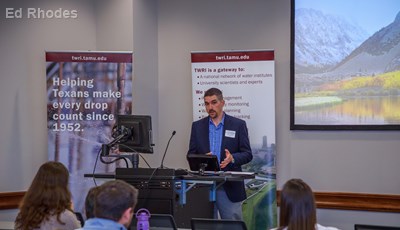The Texas Water Resources Institute (TWRI) is holding two trainings in College Station in July for water resources professionals as part of its Texas Watershed Planning Program.
The Texas Watershed Coordinator Roundtable is set for 9:30 a.m.-3:30 p.m. July 24 at Texas A&M University’s Thomas G. Hildebrand Equine Complex, 3240 F&B Road.
This free event is for water and natural resource professionals involved in watershed protection in Texas. These roundtables are held biannually to provide a forum for establishing and maintaining dialogue between watershed coordinators. They also provide an opportunity for state and federal agencies to provide information and updates during the agency panel session.
Presenters at the roundtable will include Ryan Gerlich of Texas A&M’s Department of Biological and Agricultural Engineering, on inventory of coastal on-site sewage facilities (OSSFs), and Andy James of the Texas A&M Natural Resources Institute, on implementing the Leon River Watershed Protection Plan and OSSF perspectives. Justin Bower of the Houston-Galveston Area Council will talk about the progress on urban best management practice implementation and Jenna Walker of The Meadows Center for Water and the Environment will give an update on the Texas Stream Team.
A catered lunch from Jason’s Deli is available to participants for a cost of $10, or participants may bring their own lunch. Lunch can be paid either in advance by credit card online or with cash at the door the day of the event.
The Urban Best Management Practices for Watershed Planning Training will be July 25 in College Station. The training is set for 9 a.m.-4 p.m. at the equine complex.
The training costs $100 and includes all training materials, lunch and a certificate of completion at the end of the course. Registration is required by July 23, 2018. Register online at the Texas A&M Marketplace, or by email to nathan.glavy@ag.tamu.edu.
Nathan Glavy, TWRI’s Extension program specialist, said urban best management practices are measures that help reduce the volume and pollutant load carried by surface stormwater runoff into rivers and lakes.
“This course will cover typical urban management measures used in watershed planning,” he said.
Dr. Fouad Jaber, AgriLife Extension program specialist for the Texas A&M AgriLife Research and Extension Center in Dallas, will present on green infrastructure for stormwater and low impact development (LID).
Jaber said LID refers to practices such as bio-retention, green roofs, rainwater harvesting and permeable pavement that manage stormwater in an urbanized setting in a way that minimizes impact to the environment while increasing cost effectiveness and sustainability.
Staff from the city of College Station will cover how they use ordinances to prevent and control pollution as well as encourage implementation.
David Batts, director of system solutions at EcoServices, will present on effective ways to promote LID to get developer buy-in including the benefits of LID, examples of multifunctional design and maintenance requirements.
This training will also include a tour of LID and green infrastructure in College Station.
Glavy encourages participants to dress casual and comfortable as they will be walking in the field in the afternoon for the LID tour.
More information can be found at nrt.tamu.edu/schedule/ or by contacting Glavy at nathan.glavy@ag.tamu.edu.
The Texas Watershed Planning Program is managed by TWRI and is funded through a Clean Water Act Section 319(h) nonpoint source grant provided by the Texas State Soil and Water Conservation Board and U.S. Environmental Protection Agency.


